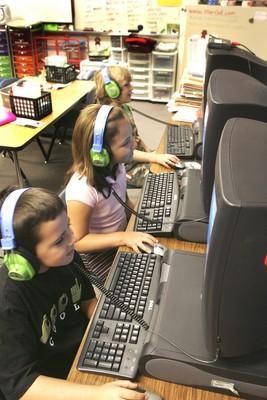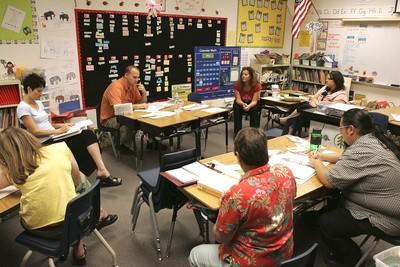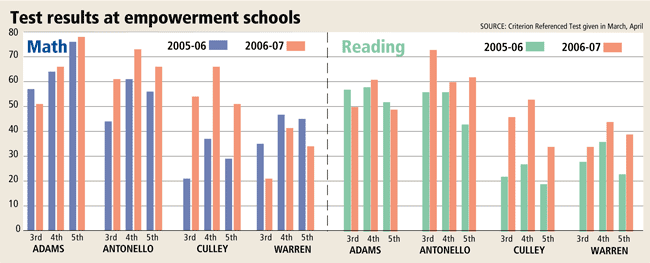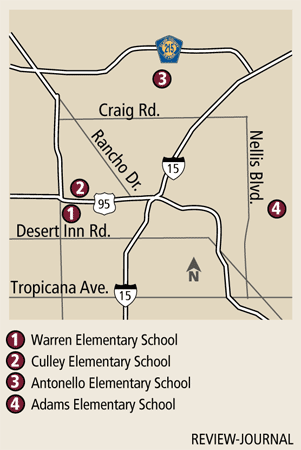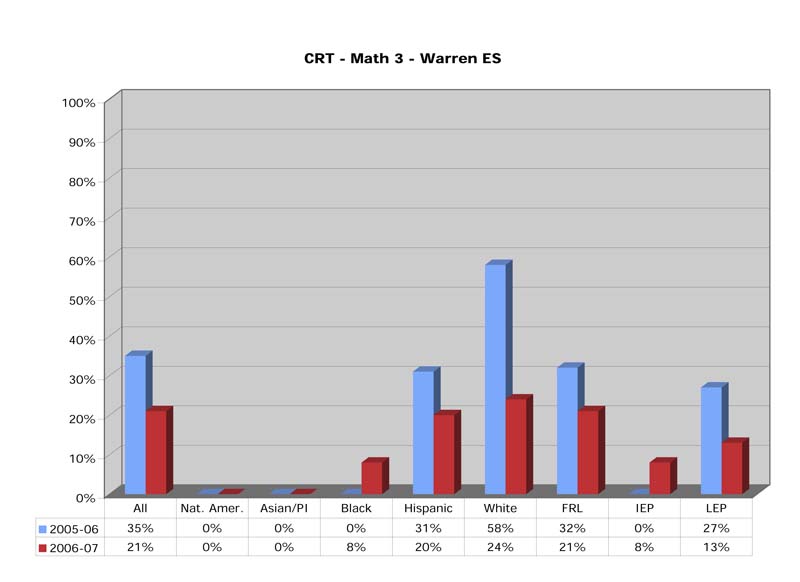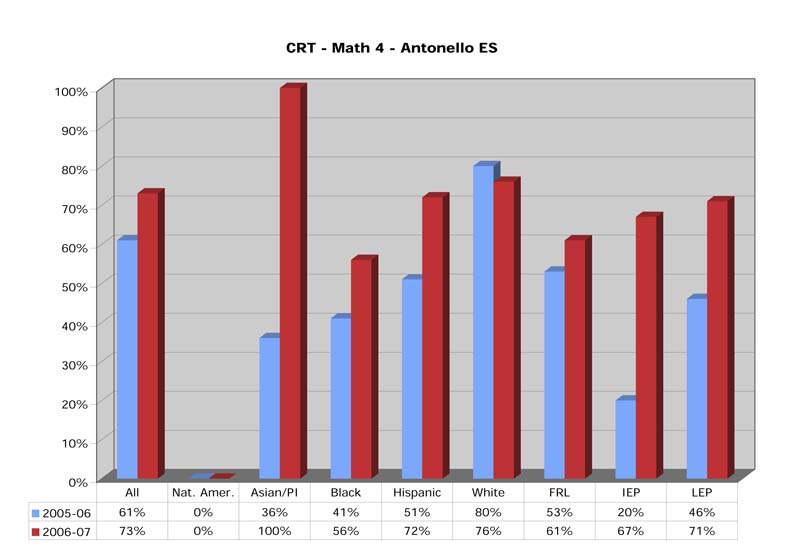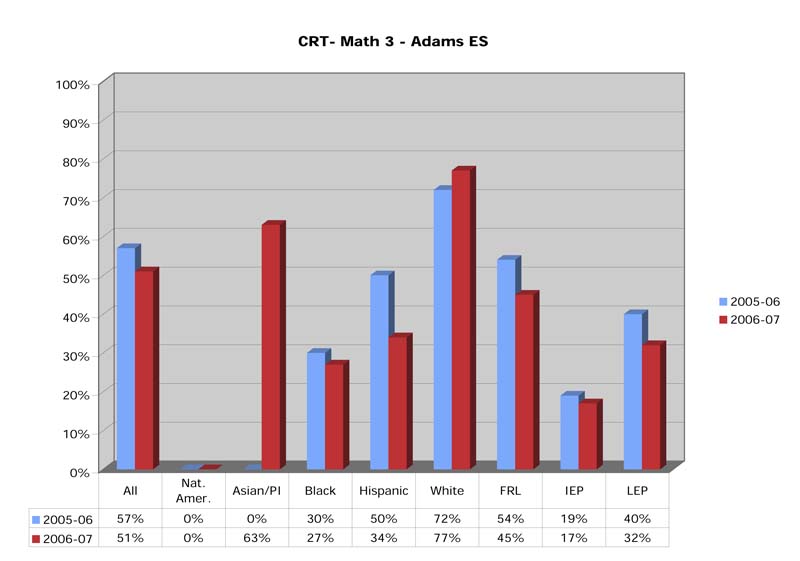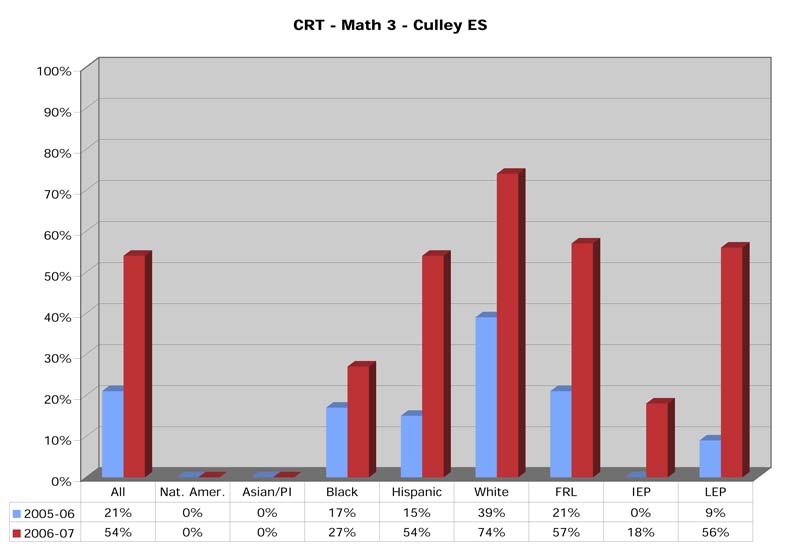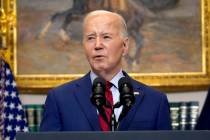Results cause for optimism
Clark County School District's experiment with empowerment schools appears to be working, at least with two of the four schools in the pilot program.
The first evidence of how the four empowerment schools fared in the district indicates that two schools made significant strides improving student performance, while two others had mixed results.
District officials on Wednesday released the results of the schools' performance on the state's Criterion Referenced Test, or CRTs, given in March and April.
Empowerment schools are campuses where principals get more authority in determining their school's budget and teachers are allowed leeway to determine programs that fit the needs of their schools.
The four schools' CRT results for third- through fifth-grade students in math and reading were compared with last year's results for students in those grades.
Together, Culley and Antonello's CRT results showed largely double-digit percentage point improvements. But the other two campuses in the pilot program, Adams and Warren elementary schools, didn't fare as well. Those schools showed gains in some areas but also slides in certain subjects and grade levels.
Students in third- through eighth-grade take CRTs, the standardized tests that determine whether students are learning at their grade level based on the state's curriculum.
Based on the test results at Culley and Antonello, Superintendent Walt Rulffes said he is optimistic that empowerment schools will improve student performance on a long-term basis.
"There are powerful indicators from the first-year empowerment school results that, given the right conditions and some additional funding, empowerment schools can dramatically improve student performance," Rulffes said.
He added that the mixed results at Adams and Warren have to be analyzed further.
"The jury is still out on those schools, but successful implementation was expected to take longer than a year," Rulffes said.
The four empowerment schools have an additional 29 minutes per day and five additional schools days in the year.
The district has allocated them $600 more per student than traditional elementary schools, money mostly used to pay for the extra time teachers spend instructing.
The empowerment model has been hailed by its supporters as an initiative that will reform public school education.
The Legislature recently allocated $10 million for 29 empowerment schools statewide; 16 empowerment schools in Clark County are expected to receive state funding at a cost of $400 more per student during the 2008-09 school year.
Melissa Subbotin, spokeswoman for Gov. Jim Gibbons, said Clark County's results are positive news and need to be studied in order to pave a road for the new empowerment schools that will be added statewide.
"These results will help future empowerment schools to establish curriculum and their academic agenda," Subbotin said. "We're sure that these schools will build on their successes and examine the results that disappointed them."
Gibbons supported a plan to fund 100 empowerment schools statewide for $60 million.
The $10 million passed by the Legislature for the program was a compromise.
Adams Principal Rebecca Johnson said she wasn't discouraged by her school's test results. At Adams, math scores for third-grade students, reading scores for third-grade students, and reading scores for fifth-grade students all dropped by 3 or more percentage points.
The school showed moderate gains in other areas.
Johnson said she expects her school's scores to increase as her teachers get more acclimated with the empowerment concept.
"We did a lot of different things this year. There was a lot on people's plates," Johnson said. "Now we just have to fine tune things and do what we did well even better."
Culley Principal Lisa Primas said she was ecstatic about her school's performance on the CRTs. The school improved in reading and math for students in third- through fifth-grade.
Scores for third-grade math students at Culley shot up by 33 percentage points compared to last year's third graders.
Culley receives federal funding because all of its students come from low-income homes.
Primas credited a newly introduced reading program for some of her school's success.
In that program, students spend an hour each day focused on reading. But her program was unique because students' reading skills were assessed and categorized.
Students from different grade levels were placed into one classroom if they read at the same level. That would allow teachers to focus on students who are equal in ability in reading.
Culley students in third- through fifth-grade showed improvement of at least 15 percentage points in reading.
Primas said the results indicate that socioeconomic burdens shouldn't hinder a student's abilities to learn.
"It doesn't matter where a child comes from and what their environment is at home," Primas said. "It's about attitude and expectations at the school."
But it's not all about academics at empowerment schools.
At Antonello, students refer to Wednesdays as "Wonderful Wednesdays."
The school introduced an after-school program that offers students about 45 different activities every Wednesday. The activities, which last about an hour, range from digital scrapbooking to unicylcing to dance classes.
"Everyone shows up on Wednesdays," Principal Linda Reese said last month. "The idea is that on regular school days we push the core subjects. But Wednesday is our opportunity to have fun with the kids."
Apparently the school's teachers spent enough time focusing on the subjects of math, reading and writing as well. The North Las Vegas school improved in every category for third- through fifth-grade in reading and math by at least 4 percentage points.
The test results show that given the proper circumstances, schools funded at higher levels can produce better results, said Karlene Lee, one of the administrators who manage the empowerment schools.
"It's a promising practice," Lee said of empowerment schools. "More money used appropriately can make a difference."



